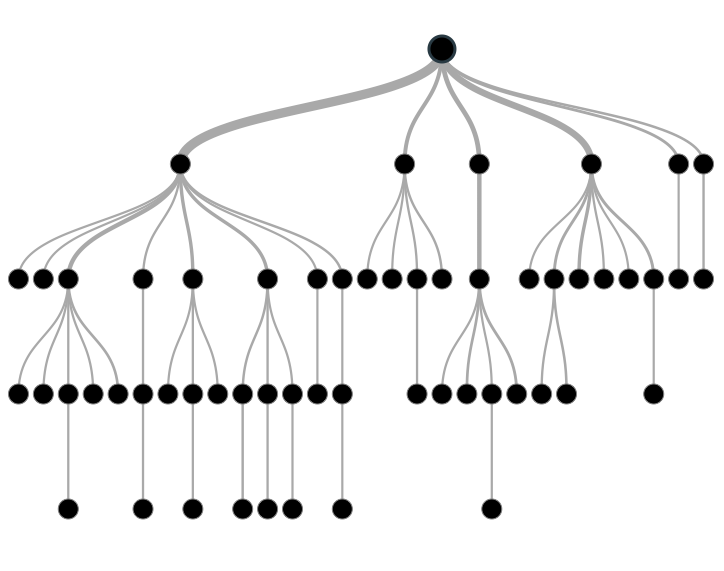The Canadian state has had an interesting relationship with networks since the beginning. Networks connect things and enable outcomes. Those who direct and influence the State have preferences for what those outcomes should be. To understand how the state is grappling with the consequences of social networks, it might be useful to look at how it has grappled with physical networks. We’ll begin with some basic theory about the Canadian State. Canada is made of citizens. Some of those citizens become leaders. Those leaders try to create some explainable representation of society’s optimal social welfare function, and package it into something people can recognize, understand and vote for. They do that because they need the consent of the citizens in[…]
Tag: technology
Benedict Evans writes fantastic writing prompts. He’ll make references to different first principles, and he’ll go onto build arguments out of them later. Sometimes I agree with them. Sometimes I don’t. He does provoke thought. One theme is the nature of people. On October 9, 2020, Benedict Evans wrote: We connected everybody, and that meant we connected all the bad people and the idiots, and our own worst instincts, and all society’s problems get expressed in software. Sometimes the Internet amplifies and channels that, but maybe sometimes the Internet is people. On April 23, 2021, Benedict Evans wrote: Old: if you make something idiot-proof, God creates a better idiot. New: if you create an Internet service that’s proof against assholes,[…]
Somewhere along the way, I came to believe that the word causal came from the word because. Because there’s a cause contained in the word because. The word is almost like a commandment. Be the cause. I don’t think that’s really true. It’s just a silly association. The word because seems to be an element of a persuasive argument. How about a little thought experiment? Consider the assessment: “Peaches are gross.” Okay, you may have one or many positions on this controversial subject: You agree because your experience matches that statement, you disagree because your experience does not match that statement, you may not agree nor disagree because it’s possible that some peaches are gross and some other peaches are[…]
Maybe you should read Thomas Kuhn’s The Structure of Scientific Revolutions. Maybe you shouldn’t. Here’s a little bit of information to make up your own mind. When I use the word paradigm, I mean it in the Kuhnian sense. I don’t use it as a hyperbole or superlative. I don’t look at a new ice cream brand extension and breathlessly declare that it’s a paradigm shift in desert delivery. Paradigm shouldn’t be a buzzword. Kuhn defined a scientific paradigm as a set of evidence, experiments, achievements and observations that are universally recognized, that provide a set of problems and solutions that are worthy of a communities’ focus. Communities are very particular about what they consider to be knowledge and what[…]
2020 hasn’t been easy. Figures from the US Census Household Pulse Survey can be used to tell a story of anxiety, hunger, depression, desperation and hopelessness. Millions are hurting. 2020 is hitting the poor, the young, and those who are low to mid-skilled the hardest. 2021 isn’t looking easy. Vaccines will take time to rollout. The recovery depends on collective health security. Health security causes confidence, confidence causes increased risk tolerance, increased risk tolerance leads to investment, and investment stimulates growth in private sector productivity, labour market demand, and opportunity. It will take time for each part of the chain to develop. It all lags. A return to the previous trend line doesn’t address the underlining cause of wage polarization.[…]
Software agility is not business agility (Klaus, 2018). If that sounds true to you, then the rest of this post should be a fun read. If it is not, this may be challenging. It could still be a fun read. Software Agility The collection of knowledge called Agile Methods, as applied to developing valuable software, is deep and broad. Much of the variance both within communities and across communities is caused by the ambiguities in their experiences and where they’re at in their personal and leadership development. There are good reasons for the distinctions among the different forms of Agile. The Universe is whatever you say it is, so just say. Business, Busyness, Problems Have you ever participated in a[…]
Marty Cagan lists four big risks in product development: value risk (will they buy it?) usability risk (can they figure out how to use it?) feasibility risk (can engineers build it?) business viability risk (can the business work with it?) Cagan’s framework is a great read. I’d like to build on and acknowledge Cagan’s ideas here. The intimate relationship Canadians have with risk Water is to fish as risk is to Canadians. If you aren’t from here, maybe you’d be in a better position to see it. There’s a skill, called inversion, that I think Canadians are pretty good at. You imagine the worst that can happen, and then you write plans to avoid those nightmare from coming true. It’s a good skill. I[…]
There’s an entire complex rooted on the idea that business plans are intelligently designed. Let’s probe that idea a bit. I enjoy Eric Beinhocker’s ideas about complexity economics. I’ve written of his ideas again and again and again. One of the most polarizing talks I’ve ever given was centred on his idea of a Library of Smith. It’s the idea that every single business plan that has ever been written, will ever be written, or can ever be written is contained in an imaginary library named after Adam Smith. Somewhere in this library is the elusive Google Business Plan from 1999. There’s also GE’s business plan for 1956. And another business plan with the letter ‘A’, repeated 99,000 times. I[…]
Canadians are a people shaped by physical and social geography. Both explain a portion of why we are who we are, and how we relate to each other. Covid-19, an executable snippet of code wrapped in protein with the sole goal of persistence, is shaping us. It has already affected our social demography. Will it change Canada’s social geography? What It Is Population density is a pretty good indicator of attitude. I can’t make the claim that it’s always causal for all people, After all, did living with 25,000 others in a square kilometre in downtown Toronto make you more conscious of mental health challenges facing the population, or were you always conscious and chose to live with others who[…]
The one pager is a beautiful tool. It’s one page. It is something that you are bringing to a persons’ mind. It contains a limited amount of language – around 300 words or less if there is a chart or many bullet points. Most people can read it in around 90 seconds, though, some can do it in 60 seconds. Those are the constraints. You use tools to achieve goals. We’ll start there, dive into each one, and I’ll conclude with a few experiences. Goals Three common goals are to persuade, to declare, or to engage. Persuasion is often about convincing oneself, another, or a group to form a belief. Declaration is often about sharing or proclaiming a decision, fact,[…]





